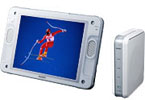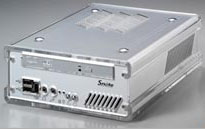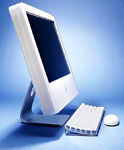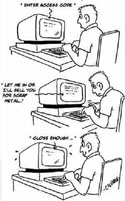Click here to see a list of previous articles.
Click the image to see larger version
2004 Is Dead; Long Live 2004!
 The USB drive is nothing new, but its advance into the gigabyte range has helped create a) a far superior replacement to a floppy and CDR and b) a very portable means of backing up important documents and taking them with you -- to meetings, to another computer, to a safe. There is little reason for most people to not have one of these.
The USB drive is nothing new, but its advance into the gigabyte range has helped create a) a far superior replacement to a floppy and CDR and b) a very portable means of backing up important documents and taking them with you -- to meetings, to another computer, to a safe. There is little reason for most people to not have one of these.
VoIP -- Voice Over IP -- has been around for a few years, but home-user access has never been what it is now. As an example, for $37 (Canadian funds), one can have a phone line, caller ID, voicemail, 3 hours of long distance in the U.S. and Canada, and virtual or alternate phone number. The virtual phone number is another phone number in another city that allows people in that city to call a local number, although they are actually calling long distance. What this means is if you have a number of people in another city -- relatives, friends and such -- they can call you at no long distance cost. You just pay a nominal monthly fee. In addition, with VoIP phones, you can bring your phone anywhere there is a broadband connection, even if you move permanently. So if I'm going to be out of town at a hotel that has Internet connections, I plug my phone in to the connection and people can call me as if I was still at home. Equally important: I can call anyone from that hotel room as if I was still at home. There are no fees from the hotel since I am using their Internet connection to make the call. VoIP has a lot of advantages; so much so, this newsletter could be entirely dedicated to VoIP. There are some disadvantages as well, so it's not for everyone, but it is an excellent in that it gives us options away from the typical local telephone monopolies. Examples of companies offering VoIP are Primus and Vonage. Shaw will also be offering the service soon, so keep your eyes out for their pricing structure.
 Digital cameras have come so far and gone down so much in price in 2004, there is very little reason for most people who take pictures to not have one. The resolution is such that you can take a picture and blow it up to an 8 x 10 with gorgeous results. Even the 14 megapixel cameras have become affordable and these cameras will let you blow up a picture to 11 x 17 without loss of quality. The primary benefit of digital cameras is taking as many pictures as you like without the necessity of printing out every one. In addition, you can view the pictures as you take them, so if it didn't turn out, you will know immediately. Whether you're seasoned or just like to take pictures of the family, digital cameras have a market for you.
Digital cameras have come so far and gone down so much in price in 2004, there is very little reason for most people who take pictures to not have one. The resolution is such that you can take a picture and blow it up to an 8 x 10 with gorgeous results. Even the 14 megapixel cameras have become affordable and these cameras will let you blow up a picture to 11 x 17 without loss of quality. The primary benefit of digital cameras is taking as many pictures as you like without the necessity of printing out every one. In addition, you can view the pictures as you take them, so if it didn't turn out, you will know immediately. Whether you're seasoned or just like to take pictures of the family, digital cameras have a market for you.
 For years, I have been nagging. Yes, I am a nagger. I nag people to back up their software and data so when their data disappears through a collosially bad circumstance, you will always have backups. For those who have a few gigs of stuff to back up, but nothing more than, say, 4 gigs' worth, DVD RW drives are cheaper than a bad hair styling job. The drives, themselves, run for under $100 and the media is almost on par with CDRWs. You should get an RW for backups as this necessitates only 5, or so, DVDs for every day of the week. The next week, you can over-write the previous week's DVDs. If you ever lose your data due to a lack of backups, you can't blame the price of a good backup! In addition to backing up, the DVDs, obviously, make for excellent archiving. I've put so many pictures and documents on this medium and have freed up space on my hard drive, it's nice to know I'll still have easy access to the documents whenever I need them.
For years, I have been nagging. Yes, I am a nagger. I nag people to back up their software and data so when their data disappears through a collosially bad circumstance, you will always have backups. For those who have a few gigs of stuff to back up, but nothing more than, say, 4 gigs' worth, DVD RW drives are cheaper than a bad hair styling job. The drives, themselves, run for under $100 and the media is almost on par with CDRWs. You should get an RW for backups as this necessitates only 5, or so, DVDs for every day of the week. The next week, you can over-write the previous week's DVDs. If you ever lose your data due to a lack of backups, you can't blame the price of a good backup! In addition to backing up, the DVDs, obviously, make for excellent archiving. I've put so many pictures and documents on this medium and have freed up space on my hard drive, it's nice to know I'll still have easy access to the documents whenever I need them.
 Imagine being able to watch television, explore the Web and check your e-mail all without connecting wires to the device that lets you do this. Now imagine being able to use this device anywhere in the world where you have wireless Internet access. When I saw this product, I almost wept. It's not that I require television everywhere I go, but the possibilities this product offers are huge. You can travel abroad and still have access to your television at home to watch the local news or even play a DVD on your home system. The options are many. Shown here is the Sony LF-X1, though I'm not certain if anyone else makes such a product. The screen is not terribly large -- only 12.1" -- but at the size of what an laptop screen was a few years ago, it is easily tolerable. Additionally, you know that the screens will only get larger in the coming years. Watch for a wireless home audio/video experience in the next few years.
Imagine being able to watch television, explore the Web and check your e-mail all without connecting wires to the device that lets you do this. Now imagine being able to use this device anywhere in the world where you have wireless Internet access. When I saw this product, I almost wept. It's not that I require television everywhere I go, but the possibilities this product offers are huge. You can travel abroad and still have access to your television at home to watch the local news or even play a DVD on your home system. The options are many. Shown here is the Sony LF-X1, though I'm not certain if anyone else makes such a product. The screen is not terribly large -- only 12.1" -- but at the size of what an laptop screen was a few years ago, it is easily tolerable. Additionally, you know that the screens will only get larger in the coming years. Watch for a wireless home audio/video experience in the next few years.
 Firefox has grown from a niche product to a mainstream success in 2004 with great reason: Its innovation, stability, user-friendliness, and lack of major security flaws make it an excellent replacement for Internet Explorer, whose major innovation has been to thwart standards of the World Wide Web. On top of the fact that, Internet Explorer causes your computers to become infected with so much spyware, popups, malware and all-things-bad. Having tended to the maladies of many computer users, I can say, without bias, that Internet Explorer is a major problem and anyone who continues to use it is just asking for more problems. Firefox even imports your Internet Explorer "Favorites", cache, and various customised settings. Firefox has a plethora of options and extensions that really let the user make more of a web browser than was considered just a couple of years ago. Take the time to explore its options if you like, or just enjoy the nice, fast, secure browser on its own. On top of all that, it's free. Click on the image to the right to download Firefox.
Firefox has grown from a niche product to a mainstream success in 2004 with great reason: Its innovation, stability, user-friendliness, and lack of major security flaws make it an excellent replacement for Internet Explorer, whose major innovation has been to thwart standards of the World Wide Web. On top of the fact that, Internet Explorer causes your computers to become infected with so much spyware, popups, malware and all-things-bad. Having tended to the maladies of many computer users, I can say, without bias, that Internet Explorer is a major problem and anyone who continues to use it is just asking for more problems. Firefox even imports your Internet Explorer "Favorites", cache, and various customised settings. Firefox has a plethora of options and extensions that really let the user make more of a web browser than was considered just a couple of years ago. Take the time to explore its options if you like, or just enjoy the nice, fast, secure browser on its own. On top of all that, it's free. Click on the image to the right to download Firefox.
 If you've ever thought your television looked like something that was just in the way when you had it turned off, Philips has created Miravision: a television that turns into a mirror when it's off. Its elegant design and thin form factor make it suitable in any environment. More importantly than the Miravision, however, is the progress of LCD and Plasma televisions. They have increased in size and reduced in price. What was bulky and expensive a few years ago is now slim and not as expensive. While you can still shop for a plasma television that goes for $10,000, you can get them for under $4,000 now.
If you've ever thought your television looked like something that was just in the way when you had it turned off, Philips has created Miravision: a television that turns into a mirror when it's off. Its elegant design and thin form factor make it suitable in any environment. More importantly than the Miravision, however, is the progress of LCD and Plasma televisions. They have increased in size and reduced in price. What was bulky and expensive a few years ago is now slim and not as expensive. While you can still shop for a plasma television that goes for $10,000, you can get them for under $4,000 now.
GMail -- Google's foray into the web-based e-mail products shook the foundation of all other providers, such as Yahoo and Hotmail. The first advantage was allowing for a gigabyte of storage, far exceeding the 2 megs of limited space that some accounts allowed. They even had the gall to charge you for 5 megs! In addition to space, Google's web-mail also allows you to keep track of conversations in e-mail by sorting mail via threads (that is, noting which mails were replied to and sorting them in order of dates responded), making it easier to find messages from people. You can only get a gmail account through an invite and each account only has six invites. I haven't used any of mine yet. If you would like a Google mail account, e-mail me and I'll send you an invitation.
 The last product isn't really one product, but it goes towards innovation of the home computer in 2004. For the past nearly 25 years, users of the PC have been mostly relegated to large boxes for their computers.
The last product isn't really one product, but it goes towards innovation of the home computer in 2004. For the past nearly 25 years, users of the PC have been mostly relegated to large boxes for their computers.  Finding a spot on a small desk or setting aside a fair amount of space has been the standard practice. Now, we are finding companies creating computers with space in mind. Below you see some spiffy innovations by companies for the PC. There is also the iMac G5. The Mac, since its inception, has always been a computer to take up little space, but this one goes even further. Sony has a system very much like it for the PC side which you can see by clicking this link. All in all, it's been an awesome year for computer design. Look forward to more innovations in ways we probably don't quite expect.
Finding a spot on a small desk or setting aside a fair amount of space has been the standard practice. Now, we are finding companies creating computers with space in mind. Below you see some spiffy innovations by companies for the PC. There is also the iMac G5. The Mac, since its inception, has always been a computer to take up little space, but this one goes even further. Sony has a system very much like it for the PC side which you can see by clicking this link. All in all, it's been an awesome year for computer design. Look forward to more innovations in ways we probably don't quite expect.

Next week, we'll explore the world of e-mail hoaxes. For good or bad, sometimes people just pass along information without knowing if it's true. It may even sound true, but there are usually dead give-aways that you can spot.
If you'd like to stop receiving this newsletter, click on the unsubscribe button below (it will bring up an e-mail to me) and just click send. Conversely, if you think someone else could benefit from receiving this, feel free to forward this mail to them. If you don't receive this currently and would like to subscribe, click on the subscribe button below and click on send.
If you have any comments, questions or concerns about this newsletter, feel free to e-mail me at sean@beggs.ca.
If you would like to UNSUBSCRIBE to this newsletter, click here or send an e-mail to sean@beggs.ca with "unsubscribe" in the newsletter.
If you would like to SUBSCRIBE to this newsletter, click here or send an e-mail to sean@beggs.ca with "subscribe" in the newsletter.
© Copyright 2005, Sean Beggs

